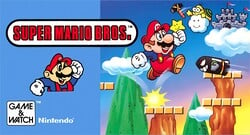Super Mario Bros. (Game & Watch): Difference between revisions
No edit summary |
mNo edit summary |
||
| Line 5: | Line 5: | ||
|developer=[[Nintendo]] | |developer=[[Nintendo]] | ||
|publisher=Nintendo | |publisher=Nintendo | ||
|released= | |released=June 25, 1986 (Crystal Screen)<ref>[http://www.intheattic.co.uk/super_mario_bros.htm Crystal Screen ''Super Mario Bros.'' info page at In the Attic]. Retrieved August 11, 2020</ref><br>August 19, 1987 (special version)<br>March 8, 1988 (New Wide Screen)<ref>[http://www.intheattic.co.uk/super_mario_bros_1.htm Wide Screen ''Super Mario Bros.'' info page at In the Attic] Retrieved 13 November 2010</ref> | ||
|genre=Platformer | |genre=Platformer | ||
|ratings=N/A | |ratings=N/A | ||
Revision as of 23:17, August 11, 2020
Super Mario Bros. is a Game & Watch version of Super Mario Bros. that appeared as part of the New Wide Screen and Crystal Screen series. Both of them were predated by an extremely rare "special" Game & Watch shaped like Famicom mascot Diskun, which was awarded to winners of the F-1 Grand Prix Tournament in Japan.[1][2] The Crystal Screen version had a transparent screen, while the other two versions were more basic Game & Watch systems. This is one of the few Game & Watch games that does not have a Game B.
These versions of Super Mario Bros. are all essentially the same in terms of presentation; the overall plot is the same as the console Super Mario Bros., but the game is shorter and simpler.
Story
Story from the instruction booklet[3]
Mario, Help!
I am Princess Toadstool of the Mushroom Kingdom. I am in the hands of the Bowser, King of the Koopa. Please rescue me and bring back the peace to the Kingdom of Mushroom. But Mario, you must pass through the dangerous 8 Worlds and face all the ferocious enemy that confronts you.
At the end of each world, an illusion of me will be there to guide you to the next world. However, there are also friends around you. On some of the floors you ride on, there are STARMAN and 1 UP MUSHROOM which I have hidden. These will appear when the floor is punched from the bottom with the JUMP button. The STARMAN makes you invincible for 10 seconds and the 1 UP MUSHROOM gives you 1 extra life. This is the utmost I can offer you Mario, and from here on you must use your own strength. Please save me as soon as you can.
Princess Toadstool
Bowser has kidnapped Princess Toadstool, and Mario is off to save her. The difference is that at the end of every level, Mario will find the Princess without having to fight Bowser or a boss.
Gameplay
Mario must go through eight auto-scrolling levels without falling and losing a life. When the levels are cleared, Mario must repeat them in the next loop. The second loops and onward have enemies. Further, Lakitus toss a hammer instead of tossing Spinies, and Bullet Bills will appear randomly. There is a total of nine loops of increasing difficulty. There are two types of levels: scroll screen levels and timer screen levels. In the scroll screen levels, Mario must travel a given distance displayed on the screen. In the timer screen levels, Mario has to go through the world within a given time. Mario can also obtain 1-Up Mushrooms and Super Stars by hitting platforms, just like in the NES version, at certain places during specific events within the game.[4]
The Game & Watch has a 1-bit palette (only black and white). Due to the low-powered CPU, the game does not feature Luigi or multiplayer mode.
Holding Jump and pressing the Game button will start Mario on L3-1, with 90 distance and enemies enabled.
Characters
- Mario
- The Bowser
- Bullet Bill
- Alarm Koopa (Alarm character)
- Lakitu
- Spinning Flame
- Princess Toadstool
Levels
- World No. 1 Canyon
- World No. 2 Gym
- World No. 3 Burning Room
- World No. 4 Channel
- World No. 5 Hop
- World No. 6 Beam
- World No. 7 Maze
- World No. 8 Burning Road
Gallery
References
- ^ The Handheld Games Museum: the "Special" Super Mario Bros. Retrieved 13 November 2010
- ^ In the Attic's page on the "Special" Super Mario Bros. Retrieved 13 November 2010
- ^ Super Mario Bros. manual, page 7. Retrieved November 25, 2015.
- ^ Replacement Docs - Super Mario Bros. (Wide Screen)
| Game & Watch games | ||
|---|---|---|
| Super Mario franchise | Donkey Kong (1982, MS) • Mario Bros. (1983, MS) • Mario's Cement Factory (1983, TT/NWS) • Mario's Bombs Away (1983, PS) • Donkey Kong Hockey (1984, MVS) • Super Mario Bros. (1986, CrS | 1987, Sp | 1988, NWS) • Mario the Juggler (1991, NWS) • Game & Watch: Super Mario Bros. (2020, CoS) | |
| Donkey Kong franchise | Donkey Kong (1982, MS) • Donkey Kong Jr. (1982, NWS | 1983, TT & PS) • Donkey Kong II (1983, MS) • Donkey Kong 3 (1984, MVS) • Donkey Kong Circus (1984, PS) • Donkey Kong Hockey (1984, MVS) | |
| Miscellaneous | Green House (1982, MS) | |
| MS: Multi Screen • TT: Table Top • PS: Panorama Screen • NWS: New Wide Screen • MVS: Micro VS. System • CrS: Crystal Screen • Sp: Special • CoS: Color Screen | ||










